Politics
APC Claims Early Lead in Edo Governorship Election
Published
4 months agoon
By
Ekwutos Blog
APC claims to have taken an early lead in the Edo governorship election, citing initial vote counts as the party looks toward victory.
The Edo State governorship election was held on Saturday, and the All Progressives Congress (APC) has claimed that Senator Monday Okpebholo, its candidate, is now leading the race.
APC’s National Publicity Secretary, Felix Morka, issued a statement late on Saturday night urging Nigerians to disregard erroneous poll results that are making the rounds on social media.
“The attention of the All Progressives Congress (APC) has been drawn to some reports circulating in sections of social media by certain political parties peddling bogus figures of vote tallies in the ongoing Edo State Gubernatorial Election,” the statement titled “DISREGARD FAKE ELECTION FIGURES/ RESULT IN CIRCULATION- COLLATION ACTIVELY IN PROGRESS” reads in full.
We implore the electors of Edo State and the broader public to ignore these fraudulent and wildly speculative reports.
The great Party would want to make it clear that the Ward level collation process is still in progress and will not be completed. In fact, most local government areas in the state have not even started, let alone finished, their local government level collation.
The Independent National Electoral Commission (INEC) is the only entity authorized under the Electoral Act to compile results at the Ward, Local Government, and State levels and to formally announce the Election’s outcome.
Although our wonderful Party has a commanding early lead, we will not try to thwart INEC’s formal announcement of the results or the end of the election process as responsible Party.
We implore the people to ignore this attempt at deception and to wait for INEC’s official election decision.
You may like
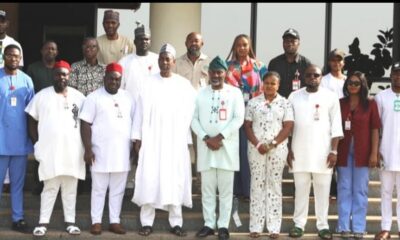

South-East Students to EFCC: “We are Sorry for the Loss of your Officer”.


A non Commissioned Officer Killed Ironsi..
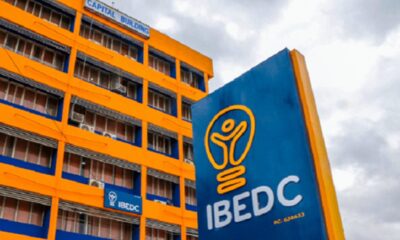

Electricity company bars prepaid metre customers from recharging below N5,000.


JUST IN: Three children, 12 others roasted to death in Enugu petrol tanker explosion


Celebrations Erupt in Orsu After Notorious Criminal and His Mother Are Captured and Sent to the Other Side of the World
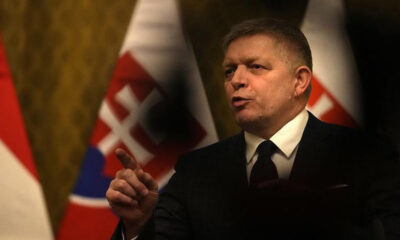

Tens of thousands protest across Slovakia against PM Robert Fico’s stance on Russia
Politics
A non Commissioned Officer Killed Ironsi..
Published
11 hours agoon
January 25, 2025By
Ekwutos Blog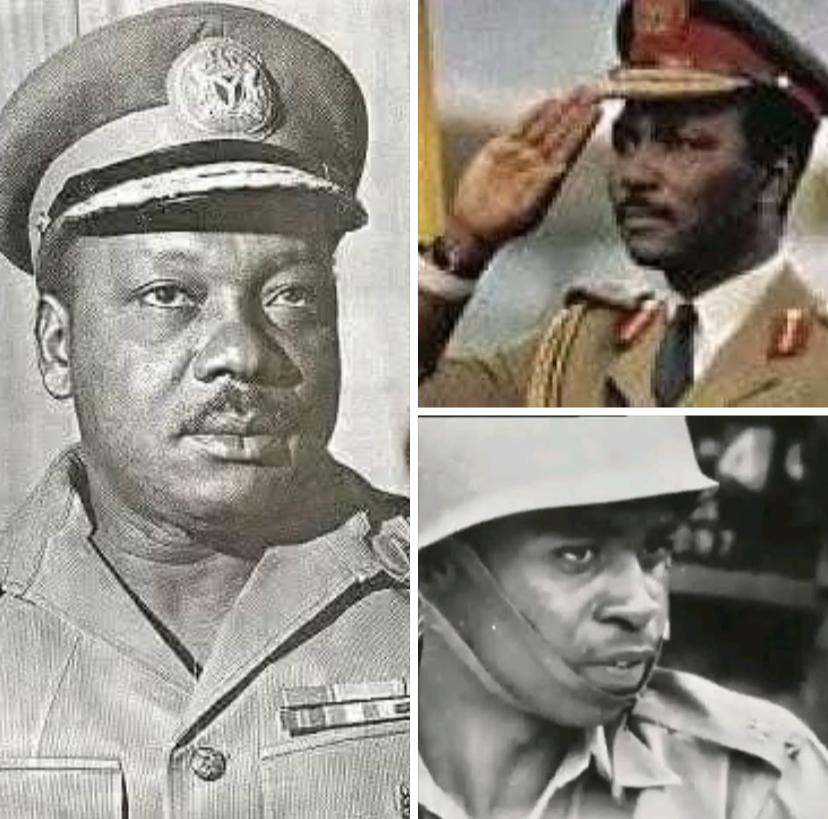
Fifty seven years after his assassination, the departure of General Johnson Aguiyi – Ironsi continues to be engulfed in mystery. Even those closest to him came out with different versions of what transpired in Ibadan, on July 29, 1966.
In all accounts, it is impossible to name who really shot the first African to command United Nations forces and the first Nigerian general. What is certain is that the trigger was pulled by a Non Commissioned Officer ( NCO) after commissioned officers lost control of the rabid situation.
Recently, Col. Sani Bello, then a Second Lieutenant and Ironsi’s Army Aide de Camp ( ADC) debunked claims that he made a deal with the Air Force ADC, Lt. Andrew Nwankwo. The supposed agreement benefitted the duo who escaped as their boss faced imminent death.
Fifty seven years after his assassination, the departure of General Johnson Aguiyi – Ironsi continues to be engulfed in mystery. Even those closest to him came out with different versions of what transpired in Ibadan, on July 29, 1966.
In all accounts, it is impossible to name who really shot the first African to command United Nations forces and the first Nigerian general. What is certain is that the trigger was pulled by a Non Commissioned Officer ( NCO) after commissioned officers lost control of the rabid situation.
Recently, Col. Sani Bello, then a Second Lieutenant and Ironsi’s Army Aide de Camp ( ADC) debunked claims that he made a deal with the Air Force ADC, Lt. Andrew Nwankwo. The supposed agreement benefitted the duo who escaped as their boss faced imminent death.
Our electric bike will crash price of goods and fight climate change – Adekunle Ajasin Varsity….0:00 / 1:00
It is curious that it took 57 years for Bello to come out with this version. Nwankwo is late now, so it is difficult to get his reaction. However, I find it odd that a brave officer would agree to run away instead of defending his principal even if death was the price.
Lt. Akintunde Akinsehinwa died defending Gen. Murtala Mohammed in 1976. Maj. Usman Bello was killed as he tried to fight for Gen. Ibrahim Babangida, in 1990. From Bello’s account, he was arrested and detained when he went to ascertain what had become of those who were sent to find out what went wrong at Government House, Ibadan.
While Nwankwo announced to Biafrans that Bello saved him, the latter credits Garba Dada Paiko as their saviour who ordered them into a Land Rover as the killer gang got really blood thirsty. This account makes some sense since Bello and the Ironsi family have continued to relate.
I tend to agree with Bello that he was going to be gunned down, like Ironsi and Col. Adekunle Fajuyi, until Dada Paiko intervened. What I do not know is what happened to Adamu Umoru, Fajuyi’s ADC who was with the other subalterns at Government House Ibadan during the coup.
Paiko and Bello hailed from Bida Province, that could have worked. If Paiko desired, he would have left Nwankwo with the assassins instead of taking him away with Bello. The moment he was about to drive off, Sgt. Tijanni Maiduguri fired the shot that killed the military governor of Western Region.
It is almost certain that no commissioned officer was there when Ironsi died. That explains the different names being bandied about since 1966. Yakubu Danjuma, Dada Paiko, William Walbe, Nuhu Nathan, Clement Dabang, Musa Bitiyong, Ibrahim Rabo, Bako Wali, all these names keep popping up.
Dada Paiko played a major role in the abduction of Ironsi and Fajuyi but denied killing the general. He came out with another puzzle. The name Sgt. Bakari Baba Lapai should interest everyone. He was alleged to have hit Danjuma’s shoulders for wasting time with the Head of State.
According to Paiko, while Nuhu Nathan snatched Ironsi’s crocodile swagger stick called Charlie, Baba Lapai disappeared with it. Till date, there is no trace of Bakari Baba Lapai in Nigeria Army records, so said Paiko who unfortunately, is not alive today to repeat himself.
Search for:
Search
Home
News
E-Editions
Politics
Metro
Business
Sports
Editorial
Columns
Allure
Columns
August 5, 2023
Unknown Gunman Shot Ironsi, By Emeka Obasi
Aguiyi-Ironsi
Aguiyi-Ironsi
Fifty seven years after his assassination, the departure of General Johnson Aguiyi – Ironsi continues to be engulfed in mystery. Even those closest to him came out with different versions of what transpired in Ibadan, on July 29, 1966.
In all accounts, it is impossible to name who really shot the first African to command United Nations forces and the first Nigerian general. What is certain is that the trigger was pulled by a Non Commissioned Officer ( NCO) after commissioned officers lost control of the rabid situation.
Recently, Col. Sani Bello, then a Second Lieutenant and Ironsi’s Army Aide de Camp ( ADC) debunked claims that he made a deal with the Air Force ADC, Lt. Andrew Nwankwo. The supposed agreement benefitted the duo who escaped as their boss faced imminent death.
Our electric bike will crash price of goods and fight climate change – Adekunle Ajasin Varsity….0:00 / 1:00
It is curious that it took 57 years for Bello to come out with this version. Nwankwo is late now, so it is difficult to get his reaction. However, I find it odd that a brave officer would agree to run away instead of defending his principal even if death was the price.
Lt. Akintunde Akinsehinwa died defending Gen. Murtala Mohammed in 1976. Maj. Usman Bello was killed as he tried to fight for Gen. Ibrahim Babangida, in 1990. From Bello’s account, he was arrested and detained when he went to ascertain what had become of those who were sent to find out what went wrong at Government House, Ibadan.
While Nwankwo announced to Biafrans that Bello saved him, the latter credits Garba Dada Paiko as their saviour who ordered them into a Land Rover as the killer gang got really blood thirsty. This account makes some sense since Bello and the Ironsi family have continued to relate.
I tend to agree with Bello that he was going to be gunned down, like Ironsi and Col. Adekunle Fajuyi, until Dada Paiko intervened. What I do not know is what happened to Adamu Umoru, Fajuyi’s ADC who was with the other subalterns at Government House Ibadan during the coup.
Paiko and Bello hailed from Bida Province, that could have worked. If Paiko desired, he would have left Nwankwo with the assassins instead of taking him away with Bello. The moment he was about to drive off, Sgt. Tijanni Maiduguri fired the shot that killed the military governor of Western Region.
It is almost certain that no commissioned officer was there when Ironsi died. That explains the different names being bandied about since 1966. Yakubu Danjuma, Dada Paiko, William Walbe, Nuhu Nathan, Clement Dabang, Musa Bitiyong, Ibrahim Rabo, Bako Wali, all these names keep popping up.
Dada Paiko played a major role in the abduction of Ironsi and Fajuyi but denied killing the general. He came out with another puzzle. The name Sgt. Bakari Baba Lapai should interest everyone. He was alleged to have hit Danjuma’s shoulders for wasting time with the Head of State.
According to Paiko, while Nuhu Nathan snatched Ironsi’s crocodile swagger stick called Charlie, Baba Lapai disappeared with it. Till date, there is no trace of Bakari Baba Lapai in Nigeria Army records, so said Paiko who unfortunately, is not alive today to repeat himself.
Related News
JAN 15, 1966 COUP: Eye witness to a morning of murder, mayhem, carnage
January 15, 1966: A morning of murder, mayhem and carnage
ABATI VS TOS BENSON, by Emeka Obasi
Paiko further explained that while in the United States in 1963, he came across one Vararo Segura, an Ifa high priest, also known as Obafemi. The story was that supreme power in the world was with Orisha, and it was believed that Chief Ladoke Akintola, governor of Western Region, before Fajuyi possessed such power.
Segura tried to convince Dada Paiko that someone snatched the power from Akintola after his assassination in January 1966. And the verdict was that Ironsi had it in his crocodile swagger stick. A funny tale because the general was in Lagos at the time Emma
Nwobosi led troops to kill Akintola in Ibadan.
The fear of Ironsi was real. As a United Nations Peace keeper in the Congo, he braved Katanga rebels to rescue an Austrian medical team and some Nigerian soldiers. That act earned him the Ritter Kruez ( First Class) medal.
The Congolese rebels under Moise Tshombe were dreaded as cannibals. The killing of Lt. G. Ezeugbana confirmed it. Lt. Olusegun Obasanjo was lucky. He cheated death after being dumped in a vehicle booth. That Ironsi dared them made headlines.
The second Secretary General of the United Nations, Dag Hammarskjold, did not survive the Katanga crisis. His aircraft was blown up near Ndola, Zambia on his way to negotiate a ceasefire between UN troops and Tshombe’s soldiers.
Those who took Ironsi and Fajuyi away, knew they returned from Congo with medals. What they did not know was that the crocodile swagger stick was bought in Lubumbashi as a souvenir.
It possessed no power from Orisha. Apparently, Baba Lapai was a ghost sent from the spirit world.
The mystery is endless. Stories continue to fly. Some said Ironsi and Fajuyi were tied to a Land Rover, driven to Olodo Village along Ibadan – Iwo Road, tied to trees and executed. Another account said they were buried in a shallow grave at Lalupon. However, their bodies were exhumed from the Military Cemetery, Jericho, Ibadan.
How strange that some of the names associated with Ironsi’s death in 1966, were also killed much later over coup plots. Dabang, Rabo, Umoru died in 1976. Bitiyong was executed in 1986. Others who were part of second coup of 1966, died following a third coup in 1976. Murtala, Isa Bukar, Abdul Wya, Bukar Dimka, Mac Donald Gotibp, Sabo Kwale, all lost their lives.
Bello was commissioned on July 29, 1965. Hammarskjold was born on July 29, 1905. Ironsi died on July 29, 1966. His successor, Yakubu Gowon, was overthrown on July 29, 1975. Murtala who led the coup against Ironsi, became Head of State on July 29, 1975.
Politics
Tens of thousands protest across Slovakia against PM Robert Fico’s stance on Russia
Published
16 hours agoon
January 25, 2025By
Ekwutos Blog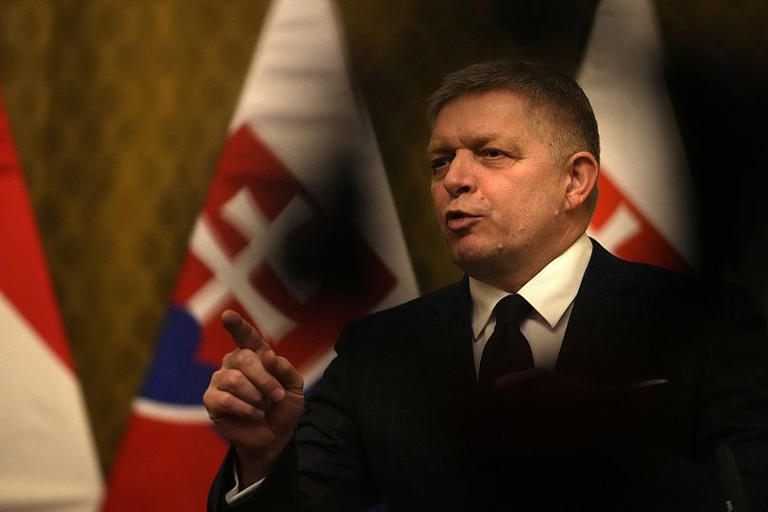
Tens of thousands of people have taken to the streets across Slovakia to voice their opposition to the policies of Prime Minister Robert Rico who they accuse of being pro-Russia.
The latest wave of anti-government rallies was fuelled by Fico’s trip to Moscow on Thursday to meet Russian President Vladimir Putin, a rare visit to the Kremlin by a European Union leader since Moscow’s 2022 invasion of Ukraine.

A protester blows a whistle as thousands gather to oppose the policies of Prime Minister Robert Fico at a rally in Bratislava, 24 January, 2025 Denes Erdos/Copyright 2025 The AP. All rights reserved
“Slovakia belongs to Europe, we want to belong to Europe in terms of values. We do not belong to Russia, we do not actually want to collaborate with Russia in any way, and this is our position, which we must express politely but responsibly,” said Marián Kulich, the Managing Director of the Peace for Ukraine organisation, speaking at a rally in the capital, Bratislava.
Fico’s recent remarks that that it was a possibility to change Slovakia’s foreign policy orientation and leave the European Union and NATO were among other recent steps by the prime minister that has sparked anger among protesters.
Friday’s protests took place in 28 locations, more than double that compared to two weeks ago amid heightened tensions after Fico accused organisers and the opposition earlier this week of being in contact with an unspecified group of foreigners who he says are working toward engineering a coup in Slovakia.
Fico linked his accusations to a secret report by the country’s spy service (SIS) that he presented in parliament on Tuesday.
The details aren’t known but Fico publicly said that the opposition plans to occupy government buildings, block roads, organise a nationwide strike and provoke clashes with police forces as parts of the alleged plan to overthrow his government.
“We see a structure that wants to exploit these meetings, these rallies, primarily for a possible clash with the security forces of the state, to escalate tensions even further. To further aggression and then to fulfil the plan that is being disseminated today by the organisers of these protests,” Fico said on Friday.
Slovak leaders said that the situation was serious but the opposition dismissed the report and accused SIS of being misused for political purposes.
The organisers of most of the rallies from the Peace for Ukraine organisation dismissed Fico’s claims and said that he is trying to frighten the Slovak population.
All of the public anti-government protests since Fico’s cabinet was sworn in on 25 October, 2023, have been peaceful.
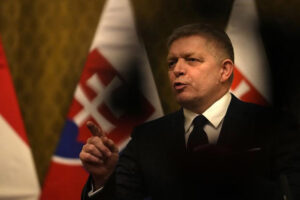
Slovakia’s Prime Minister Robert Fico addresses the media during a meeting with his Hungarian counterpart Viktor Orban in Bratislava, 21 January, 2025 Petr David Josek/Copyright 2025 The AP. All rights reserved
Organisers say their protest in Bratislava was attended by around 60,000 people and that rallies will continue on 7 February.
Ficos’s views on Russia have sharply differed from the European mainstream.
He returned to power in 2023 after his leftist party Smer (Direction) won the parliamentary election on a pro-Russia and anti-America platform.
Since then, he has ended Slovakian military aid for Ukraine, lashed out at EU sanctions on Russia and vowed to block Ukraine from joining NATO.
Fico is a polarising figure in Slovakia and survived an assassination attempt in May 2024.
Politics
Taiwan’s political divisions weaken defence stance as Trump returns
Published
18 hours agoon
January 25, 2025By
Ekwutos Blog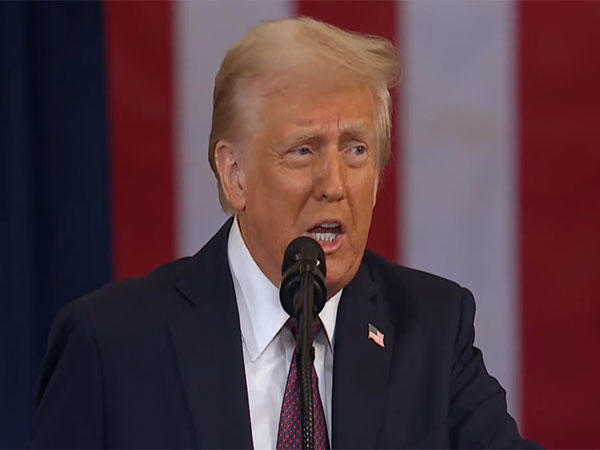
Taipei [Taiwan], January 25 (ANI): Taiwan‘s parliament has voted to freeze billions in defence spending just hours after Donald Trump‘s inauguration, raising concerns about the island’s preparedness against China‘s mounting threats, CNN reported.
The move, backed by the opposition, comes at a time when Taiwan is navigating strained relations with the United States under Trump‘s transactional approach to foreign policy. Critics warn that this decision could jeopardise Taiwan‘s military reformsand send negative signals to Washington.
Taiwan, a major semiconductor producer and democratically governed territory, faces constant threats from China, which claims the island as part of its territory. Despite never having governed Taiwan, Beijing continues to vow reunification, by force if necessary. The United States has been Taiwan‘s main arms supplier and strategic partner, but Trump‘s “America First” policy has heightened fears about whether Washington will continue its support without greater financial contributions from Taipei.
The opposition-led vote to block funding comes as Taiwan‘s President Lai Ching-te struggles with a parliament dominated by opposition forces. Critics argue that this budget freeze could weaken Taiwan‘s Defence capabilities and damage its credibility with the US “If there is not enough budget to consistently improve Taiwan‘s defence reforms and capabilities, the international community will doubt Taiwan‘s determination to defend ourselves,” Lai said in a Facebook post. The frozen funds impact key projects, including the development of indigenous submarines and drones.
Taiwan‘s Premier Cho Jung-tai strongly condemned the opposition’s actions, calling them “suicidal” and warning that they send “the wrong signal to the United States.” Defence Minister Wellington Koo echoed these concerns, emphasising that the freeze could undermine Taiwan‘s military modernisation efforts. Trump, known for his criticism of Taiwan‘s defence spending, previously called for the island to increase its defence allocation to 10 per cent of GDP – a fourfold increase from its current levels.
Taiwan‘s defence spending has faced scrutiny even before Trump‘s return. A backlog of more than USD 20 billion in undelivered US military equipment has hampered Taiwan‘s modernisation efforts. Concerns have also been raised about Taiwan‘s reliance on asymmetric warfare strategies, which prioritise smaller, more mobile systems like drones and portable missiles over conventional military equipment.
Defence experts argue that while progress has been made, much more needs to be done to counter the growing threat from China, which has the world’s largest standing army and spends 11 times more on defence than Taiwan, CNN reported.
Public sentiment in Taiwan reflects growing anxiety over the political deadlock. Residents have expressed concern about how the opposition-led freeze might be perceived by the US “I hope that Taiwan‘s legislature doesn’t embarrass itself and lose face to foreign countries,” said Wang Cheng-yi, a postgraduate student at National TaiwanUniversity. Ms. Hsu, a 75-year-old Taipei resident, emphasised the importance of unity, saying, “Everybody should sit down and talk. Taiwan must balance relations with both the US and China. We are small. We cannot afford to make either big brother unhappy.”
China‘s growing military aggression and diplomatic isolation of Taiwan have added urgency to the island’s defence preparations. Last year, US intelligence suggested that Chinese President Xi Jinping had instructed his military to prepare for an invasion of Taiwan by 2027. While this does not guarantee an invasion, it underscores the escalating threat. The United States has historically maintained a policy of “strategic ambiguity” under the Taiwan Relations Act, which commits Washington to providing Taiwan with the means to defend itself without explicitly promising military intervention.
Taiwan‘s military reforms have faced criticism for their slow pace. Issues such as inadequate reservist training and delays in deploying advanced weaponry have drawn scrutiny. The ongoing debate over Taiwan‘s indigenous submarine program further highlights the challenges. Alexander Huang, head of international affairs for the opposition Kuomintang party, defended the budget freeze, stating, “We are not opposing indigenous weapon system development. However, we emphasise that we need to be very prudent to make sure our self-designed submarine can actually work.”
The political discord also extends to Taiwan‘s infrastructure. Earlier this week, undersea cables connecting Taiwan to the Matsu islands were severed due to “natural deterioration,” disrupting internet services in the area. The digital affairs ministry has warned that further budget cuts could hinder the maintenance of critical infrastructure, leaving Taiwan vulnerable to potential exploitation by Beijing.
Despite these challenges, some Taiwanese remain optimistic. Yeh Hsin-wei, a student in Taipei, pointed to Taiwan‘s semiconductor industry as a key deterrent against Beijing. “The world needs our chips, so I think China wouldn’t risk a war,” he said to CNN. “We need to be prepared, but maybe not worry too much.”
Analysts have urged Taiwan‘s government to focus on presenting a united front, especially in light of Trump‘s return to the White House. “With or without Trump‘s inauguration, with China‘s increasing aggression over Taiwan, it is indeed Taiwan‘s top priority to continue to increase its self-defence budget,” said Wei-Ting Yen, an assistant research fellow at Academia Sinica. “That’s definitely not a good signal.” (ANI)
Provided by SyndiGate Media Inc. (Syndigate.info
).

South-East Students to EFCC: “We are Sorry for the Loss of your Officer”.

A non Commissioned Officer Killed Ironsi..

Electricity company bars prepaid metre customers from recharging below N5,000.
Trending
- Politics11 months ago
Nigerian Senate passes Bill seeking the establishment of the South East Development Commission.

 Business12 months ago
Business12 months agoInflation hits record high of 29.90% on naira weakness

 Politics8 months ago
Politics8 months agoBREAKING: Federal Gov’t Offers To Pay Above N60,000, Reaches Agreement With Labour

 SportsNews11 months ago
SportsNews11 months agoOlympic Qualifiers 2024: CAF Confirms Dates For Super Falcons Vs Banyana Banyana

 Trending3 months ago
Trending3 months agoNYA demands release of ‘abducted’ Imo chairman, preaches good governance
- Business3 months ago
US court acquits Air Peace boss, slams Mayfield $4000 fine

 Politics3 months ago
Politics3 months agoMexico’s new president causes concern just weeks before the US elections
- Entertainment3 months ago
Bobrisky transferred from Immigration to FCID, spends night behind bars

